Book contents
- Frontmatter
- Contents
- Foreword by ICRC President Jakob Kellenberger
- Foreword by Judge Abdul G. Koroma
- Foreword by Yves Sandoz
- Acknowledgements
- Introduction
- List of abbreviations
- Part I The Principle of Distinction
- Part II Specifically Protected Persons and Objects
- Chapter 7 Medical and Religious Personnel and Objects (Rules 25–30)
- Chapter 8 Humanitarian Relief Personnel and Objects (Rules 31–32)
- Chapter 9 Personnel and Objects Involved in a Peacekeeping Mission (Rule 33)
- Chapter 10 Journalists (Rule 34)
- Chapter 11 Protected Zones (Rules 35–37)
- Chapter 12 Cultural Property (Rules 38–41)
- Chapter 13 Works and Installations Containing Dangerous Forces (Rule 42)
- Chapter 14 The Natural Environment (Rules 43–45)
- Part III Specific Methods of Warfare
- Part IV Weapons
- Part V Treatment of Civilians and Persons Hors De Combat
- Part VI Implementation
Chapter 7 - Medical and Religious Personnel and Objects (Rules 25–30)
Published online by Cambridge University Press: 05 June 2012
- Frontmatter
- Contents
- Foreword by ICRC President Jakob Kellenberger
- Foreword by Judge Abdul G. Koroma
- Foreword by Yves Sandoz
- Acknowledgements
- Introduction
- List of abbreviations
- Part I The Principle of Distinction
- Part II Specifically Protected Persons and Objects
- Chapter 7 Medical and Religious Personnel and Objects (Rules 25–30)
- Chapter 8 Humanitarian Relief Personnel and Objects (Rules 31–32)
- Chapter 9 Personnel and Objects Involved in a Peacekeeping Mission (Rule 33)
- Chapter 10 Journalists (Rule 34)
- Chapter 11 Protected Zones (Rules 35–37)
- Chapter 12 Cultural Property (Rules 38–41)
- Chapter 13 Works and Installations Containing Dangerous Forces (Rule 42)
- Chapter 14 The Natural Environment (Rules 43–45)
- Part III Specific Methods of Warfare
- Part IV Weapons
- Part V Treatment of Civilians and Persons Hors De Combat
- Part VI Implementation
Summary
Rule 25. Medical personnel exclusively assigned to medical duties must be respected and protected in all circumstances. They lose their protection if they commit, outside their humanitarian function, acts harmful to the enemy.
Practice
Volume II, Chapter 7, Section A.
Summary
State practice establishes this rule as a norm of customary international law applicable in both international and non-international armed conflicts.
International armed conflicts
This rule goes back to the 1864 Geneva Convention and was repeated in the subsequent Geneva Conventions of 1906 and 1929. It is now set forth in the First, Second and Fourth Geneva Conventions of 1949. Its scope was expanded in Article 15 of Additional Protocol I to cover civilian medical personnel in addition to military medical personnel in all circumstances. This extension is widely supported in State practice, which generally refers to medical personnel without distinguishing between military or civilian medical personnel. It is also supported by States not, or not at the time, party to Additional Protocol I.
Under the Statute of the International Criminal Court, “intentionally directing attacks against … personnel using the distinctive emblems of the Geneva Conventions in conformity with international law” constitutes a war crime in international armed conflicts. This war crime is relevant to medical personnel because they are entitled to use the distinctive emblems of the Geneva Conventions.
Numerous military manuals recall the obligation to respect and protect medical personnel. Under the legislation of many States, it is a war crime to violate this rule.
- Type
- Chapter
- Information
- Customary International Humanitarian Law , pp. 79 - 104Publisher: Cambridge University PressPrint publication year: 2005



